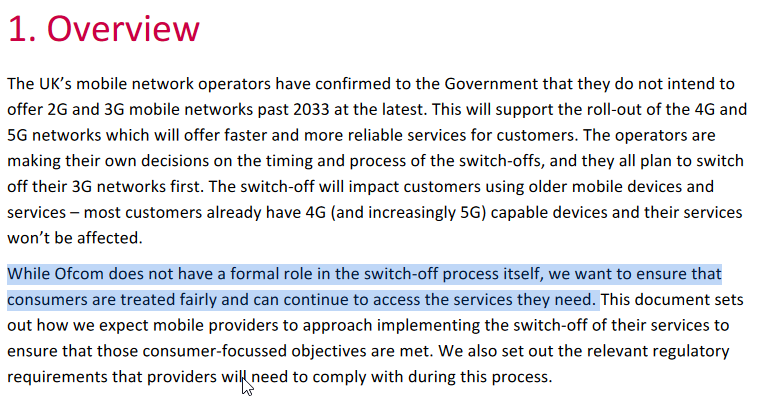In March 2022 at Buses that disappear from predictions API I raised the problem of missing predictions, initially thought to be specific to the 97 bus route, but subsequently discovered to be very negatively impacting arrival predictions on all buses in the Chingford area.
The Chingford problem has never been resolved, but a year ago (Jan 2023) @jamesevans reported:
This appears to be related to the iBus system’s use of 2G mobile network infrastructure. This is still under investigation with our colleagues in that area but the working theory is that coverage on 2G has been degraded across London by the cellular networks so that 4G & 5G services can be provisioned on existing towers. We have been doing analysis of our live vehicle tracking and working out the areas affected and the reliability of the data therein.
We’ve had no further update from TFL about whether lack of 2G is the cause of the problem (which is still fully ongoing: the predictions from the API and on the countdown screens bear no resemblance whatsoever to the services actually arriving at the corresponding stops).
Later in the thread I reported there was no indication that either Ofcom or the four network operators admitted to problems with 2G in the Chingford area.
My reason for raising it again now is that
- until 9th February Ofcom is consulting on its proposed Plan of Work for 2024/25
- in 2023, Ofcom published a statement:

- that statement begins:
- observe the sentence I have highlighted. Ofcom seems to be completely unaware that networks may have already degraded any 2G services to the extent that they already are failing to provide the needed service
- ofcom’s ignorance is compounded by a later statement:
- there is further indication that Ofcom thinks 2G will continue to provide a service after 3G is switched off:
We need to use that Plan of Work consultation to make sure Ofcom is fully aware that (some?) networks, in (some?) areas have apparently already switched off 2G services on too many masts to allow iBus to function.
But is that correct? Has it been properly investigated, and can TFL now prove that lack of 2G is and has been for the past two years a substantial reason preventing iBus from delivering the information that TFL needs to reliably predict bus arrivals?
If networks have switched off 2G prematurely, without proper notice and without Ofcom’s knowledge, there may be a precedent for requiring those networks to pay a substantial part of the cost of upgrading equipment that the networks have made prematurely obsolescent. And in times where TFL is being strapped for cash, it shouldn’t be necessary for TFL to have to pay the full cost of upgrading equipment caused entirely by inappropriate action by the networks or inadequate previous regulation by ofcom.
The two relevant precedents are:
Launching of Channel 4. This required most existing video recorders to be retuned, and those which operated on fixed frequencies had to be replaced. Though this happened about 20 years before Ofcom, the previous regulator required Channel 4 to provide a free retuning service and free replacements for equipment that could not be retuned.
Moving radio microphones from Channel 69 to 38. Around 2010, channel 69 previously used for radio microphones (called PMSE equipment by ofcom) needed to be vacated to allow the launch of 4G. Here, Ofcom was persauded that if 4G was going to earn billions, some of those billions should be used to buy back equipment that would be rendered obsolete. The result was that Ofcom launched a proportional buy back scheme. Our equipment, half way through its expected life, was bought back for half the current replacement cost.
I don’t imagine that those precedents will help much when, eventually, 2G is officially switched off at a pre-arranged date (2033 is currently suggested). At that time, 2G switchoff will be expected and users of 2G equipment should be planning for it. But I think there’s a reasonable justification, which Ofcom has accepted in the past, that if networks have already jumped the gun by switching off 2G in some areas, or degrading it to an extent that it is no longer fit for its purpose, that owners of equipment that are having to be upgraded prematurely should be fully compensated in some way.
And hence the requirement to ensure that a motion to that effect gets fully agreed as part of Ofcom’s forthcoming Plan of Work.
But first, can TFL actually provide the evidence that it’s lack of 2G which is causing TFL’s predictions to be totally unfit for their purpose?


